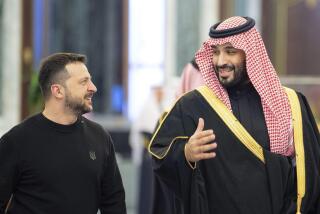Saudi Ambassador Berates Israel Before U.N. Council
UNITED NATIONS — Angering Israelis and disappointing other diplomats here, a senior Saudi official lashed out at Israel on Wednesday in a speech to the Security Council that was widely but wrongly expected to be the first public articulation of a new peace initiative promoted by Saudi Arabia.
In the much-anticipated address, the Saudi ambassador to the United Nations barely mentioned the initiative, other than to refer to the enthusiastic reception it has received from governments and commentators around the world.
Instead, he launched into a bitter attack on Israel that appeared to undermine the advertised premise of the much-touted Saudi plan.
“No one can deny that what the Palestinian people are undergoing in the occupied territories is one of the worst forms of injustice inflicted by man, one of the worst examples of pressure and persecution and racism and systematic oppression in the history of mankind,” said Ambassador Fawzi Shubukshi.
“The objective of Israel was and remains the expulsion of the Arab people from Palestine,” he angrily declared.
Saudi Arabia, which is not represented on the 15-member Security Council, had asked Tuesday for permission to address the group during an open debate on the Middle East. Diplomats who had praised the peace gestures coming from Riyadh had speculated that the Saudis would use the opportunity to clarify their seemingly shifting policy.
Saudi Crown Prince Abdullah, the country’s de facto ruler, is said to be ready to pledge the swift establishment of full diplomatic ties between Arab nations and Israel once Israel withdraws from lands it has occupied since the 1967 Middle East War.
“The idea is to send a signal to the Israeli public that peace is possible,” Adel al Jubeir, a senior aide to Abdullah, said in Washington earlier Wednesday.
But if Israeli officials or frustrated Western peace mediators were expecting further peace signals from the Saudis here, they got something quite different: a forceful and openly angry reiteration of the traditional Arab case against Israel, and an unapologetic defense of Palestinian violence.
“No one denies that every state has the right to ensure the security of its people,” Shubukshi said. “But is this right the exclusive right of Israel? Can they deprive Arabs of their rights and expand their settlement for security reasons and dominate others for security reasons and impose blockades for security reasons? Where is security for the Palestinians?
“Palestinian violence is only a result of Israeli terrorism,” he continued. “It is an expression of bitterness and frustration after many years of waiting.”
Israeli diplomats, some of whom had previously welcomed the apparent Saudi peace proposal, expressed dismay at Shubukshi’s remarks.
“We came here expecting him to elaborate about what was reported to be a peace initiative from the crown prince,” said Aaron Jacob, Israel’s deputy representative here. “And rather than that, he leveled a series of allegations against the state of Israel.”
Still, Shubukshi echoed his government’s earlier calls for peaceful negotiations in the conflict with the help of foreign mediators. “Both parties need external assistance to stop the cycle of violence,” he said. “Bitterness and mutual distrust become worse every day.”
Before the ambassador’s address, which came near the end of the two-day council debate, the nascent Saudi initiative had been repeatedly praised by other diplomats here. Countries saluting Abdullah’s “interesting ideas” and “constructive proposals” included the United States, Japan, Canada, many European states and such leading developing nations as South Africa, Singapore and Mexico.
More important, the move was also strongly backed by Egypt and Jordan, the only two Arab nations that have diplomatic relations with Israel. Tunisia and Morocco also welcomed it, though more cautiously.
And Palestinian representatives here embraced it as an endorsement by the Arab world’s most influential states of their own long-standing position that Israel should expect full diplomatic recognition from all its neighbors if it withdraws from lands occupied after the 1967 war. In order to keep the spotlight on the Saudi plan, the Palestinians decided Tuesday to table a draft Security Council resolution that they had planned to submit to a vote this week despite the near certainty of a U.S. veto.
But Syria, which would regain control of the Golan Heights if Israel accepted the Saudi formula, expressed open skepticism. The Middle East doesn’t need new initiatives but Israeli compliance with past Security Council resolutions, asserted Syrian Ambassador Mikhail Wehbe, the sole Arab representative on the council. Israel “is trying to mark time and to avoid pulling out of all occupied territories, including East Jerusalem and the Syrian Golan,” he said.
Middle East experts who have spoken privately to Abdullah’s aides in the past week said the crown prince accepted the concept of territorial trade-offs that would let Israel annex some large Jewish settlements outside Israel’s pre-1967 borders in exchange for land for Palestinians elsewhere along the border. The prince was also said to support proposals already accepted by Palestinian negotiators for continued Israeli rule in Jewish neighborhoods and holy sites in and around Jerusalem’s Old City.
But in his speech here Wednesday, Shubukshi called for Israel’s “total withdrawal from the occupied territories,” including all of East Jerusalem and the Golan Heights.
Abdullah met Wednesday in Saudi Arabia with Javier Solana, the European Union’s chief diplomat. Abdullah said he would pursue his proposal at an Arab League meeting in Lebanon next month, according to Solana’s aides.
The ambassador from Yemen, the current leader of the U.N. Arab bloc, said Wednesday that the Arab nations were unlikely to submit any further Security Council resolutions until after the Arab League conclave in Beirut, where they would try to reach a consensus position on the Saudi proposal.
More to Read
Sign up for Essential California
The most important California stories and recommendations in your inbox every morning.
You may occasionally receive promotional content from the Los Angeles Times.









